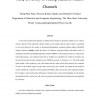Free Online Productivity Tools
i2Speak
i2Symbol
i2OCR
iTex2Img
iWeb2Print
iWeb2Shot
i2Type
iPdf2Split
iPdf2Merge
i2Bopomofo
i2Arabic
i2Style
i2Image
i2PDF
iLatex2Rtf
Sci2ools
CORR
2006
Springer
2006
Springer
ARQ Diversity in Fading Random Access Channels
A cross-layer optimization approach is adopted for the design of symmetric random access wireless systems. Instead of the traditional collision model, a more realistic physical layer model is considered in our work. Based on this model, an Incremental Redundancy Automatic Repeat reQuest (IR-ARQ) scheme, tailored to jointly combat the effects of collisions, multi-path fading, and additive noise, is developed. The Diversity-Multiplexing-Delay tradeoff (DMDT) of the proposed scheme is analyzed for fully-loaded queues, and compared with that of Gallager tree algorithm for collision resolution and the network-assisted diversity multiple access (NDMA) protocol of Tsatsanis et al.. The fully-loaded queue model is then replaced by one with random arrivals, under which these protocols are compared in terms of the stability region, average delay and diversity gain. Overall, our analytical and numerical results establish the superiority of the proposed IR-ARQ scheme and reveal some important ins...
| Added | 11 Dec 2010 |
| Updated | 11 Dec 2010 |
| Type | Journal |
| Year | 2006 |
| Where | CORR |
| Authors | Young-Han Nam, Praveen Kumar Gopala, Hesham El Gamal |
Comments (0)

